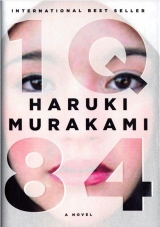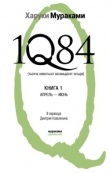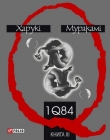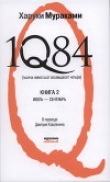
Текст книги "1q84"
Автор книги: Haruki Murakami
Жанр:
Современная проза
сообщить о нарушении
Текущая страница: 37 (всего у книги 81 страниц)
Aomame looked at him, saying nothing. He also fell silent.
“So, then, what you are telling me is that the girls’ purpose is to become pregnant? To carry your child?” Aomame then asked.
“That is correct.”
“And during this several-hour period while you lie there paralyzed, you have three ejaculations with these three girls?”
“That is correct.”
Aomame could not help but realize that she had gotten herself into a terribly complicated situation. She was about to murder this man, to send him to the other side. Yet here she was, being given the strange secrets of his flesh.
“I don’t quite understand the precise nature of your problem. All the muscles of your body become paralyzed once or twice a month. When that happens, your three girlfriends come and have sex with you. True, that is not exactly normal in commonsense terms, but—”
“They are not my girlfriends,” the man said, cutting her short. “They serve me as shrine maidens. Joining their bodies with mine is one of their duties.”
“Duties?”
“It is a role that has been assigned to them—to become pregnant with my heir.”
“Assigned by whom?” Aomame asked.
“That would be a long story,” the man said. “The problem is that all of this is steadily leading toward the destruction of my flesh.”
“So, then, have they gotten pregnant?”
“No, not yet. And there is little possibility that any of them will. They have not started their periods. Still, they are hoping for a miracle through heavenly grace.”
“None of them have gotten pregnant. They are not menstruating,” Aomame said. “And your flesh is headed for destruction.”
“Little by little, the time of each paralytic episode is growing longer. And the episodes are increasing in number. They started seven years ago. Back then, I would have one episode in two or three months. Now it is once or twice a month, and after each paralysis ends, my body is racked by excruciating pain and exhaustion. I have to live this way for a week or more each time. I feel as if my whole body is being stabbed by thick needles. I have intense headaches and an overwhelming fatigue. I find it impossible to sleep, and no medicine has done anything to alleviate the pain.”
The man sighed. Then he continued, “The second week after the episode is better than the first, but still the pain never entirely goes away. Intense pain comes over me like a wave several times a day. I can hardly breathe. My organs don’t function properly. My joints creak like a machine that needs oiling. My flesh is being devoured and my blood sucked out. I can feel it happening. But what is gnawing away at me is neither cancer nor a parasite. I have had every test they can think of, but they can never find the cause. They tell me I’m the picture of health. Medical science cannot explain my torment. The only conclusion is that this is the price I must pay for the heavenly grace I experience.”
This man is surely on the road to destruction, Aomame thought. But she could find no hint of emaciation about him. He seemed sturdily built in every way and appeared to have the discipline to withstand intense pain. And yet she could sense that his flesh was headed for destruction. This man is diseased. I don’t know what his disease might be, but even if I don’t take steps to dispatch him right now, he will suffer intense pain as his flesh is slowly destroyed and he encounters inevitable death.
“I can’t stop its progress,” the man said, as if he had read Aomame’s thoughts. “Every part of me is being eaten away, my body hollowed out, and a horribly painful death awaits me. They’ll just throw me away like a useless old car.”
“ ‘They’?” Aomame asked. “Who are ‘they’?”
“I am talking about the ones who are eating away at my flesh like this,” the man said. “But never mind that. What I am looking for now is some way to have my very real pain eased to some extent. That is what I need more than anything, even if the solution is not complete. This pain is unbearable. At times—at certain times—the pain deepens dramatically, as if it has a direct link to the center of the earth. It is a kind of pain that no one else besides me can grasp. It has robbed me of many things, but in return it has given me much. Deep, special pain bestows deep, special grace—not that the grace alleviates the pain, of course. Nor can it prevent the coming destruction.”
A deep silence followed for some moments.
Aomame finally managed to speak. “I know I keep saying the same thing, but I can’t help thinking that the techniques at my disposal can do almost nothing for your problem—especially if it is something that has come to you as a payment for heavenly grace.”
Leader sat up straight and looked at Aomame with those small, deep-set, glacier-like eyes. Then he opened his long, thin lips.
“No, I think you can do something for me—something that only you can do.”
“I hope you’re right.”
“I am right, I know it,” the man said. “I know a lot of things. If you are willing, I would like to have you start now. Do what you always do.”
“I’ll try,” Aomame said, her voice tense and hollow. What I always do, Aomame thought.
CHAPTER 10
Tengo
YOU HAVE DECLINED OUR OFFER
Tengo said good-bye to his father just before six p.m. While he waited for the taxi to come, the two of them sat across from each other by the window, saying nothing. Tengo indulged in his own unhurried thoughts while his father stared hard at the view outside the window, frowning. The sun had dropped down, and the sky’s pale blue was slowly deepening.
He had many more questions he wanted to ask, but he knew that there would be no answers coming back. The sight of his father’s tightly clenched lips told him that. His father had obviously decided to say nothing more, so Tengo decided not to ask any more. If you couldn’t understand something without an explanation, you couldn’t understand it with an explanation. As his father had said.
When the time for him to leave drew near, Tengo said, “You told me a lot today. It was indirect and often hard to grasp, but it was probably as honest and open as you could make it.”
Tengo looked at his father, but there was no change of expression.
“I still have some things I’d like to ask you, but I know they would only cause you pain. All I can do is guess the rest from what you’ve told me. You are probably not my father by blood. That is what I assume. I don’t know the details, but I have to think that in general. If I’m wrong, please tell me so.”
His father made no reply.
Tengo continued, “If my assumption is correct, that makes it easier for me. Not because I hate you, but—as I said before—because I no longer need to hate you. You seem to have raised me as your son even though we had no blood ties. I should be grateful for that. Unfortunately, we were never very good at being father and son, but that’s another problem.”
Still his father said nothing, his eyes fixed on the outdoor scene like a soldier on guard duty, determined not to miss the next signal flare sent up by the savage tribe on the distant hill. Tengo tried looking out along his father’s line of vision, but found nothing resembling a flare. The only things out there were the pine trees tinted with the coming sunset.
“I’m sorry to say it, but there is virtually nothing I can do for you—other than to hope that the process forming a vacuum inside you is a painless one. I’m sure you have suffered a lot. You must have loved my mother as deeply as you knew how. I do get that sense. But she went off somewhere. I don’t know whether the man she went with was my biological father or not, and you apparently have no intention of telling me. But in any case she left you. And me, too, an infant. Maybe you decided to raise me because you figured she would come back to you if you had me with you. But she never came back—to you or to me. That must have been hard on you, like living in an empty town. Still, you raised me in that empty town—as if to fill in the vacuum.”
His father’s expression did not change. Tengo could not tell whether he was understanding—or even hearing—what he was saying.
“My assumption may be wrong, and that might be all for the better. For both of us. But thinking about it that way helps all kinds of things to fit together nicely inside me, and my doubts are more or less resolved.”
A pack of crows cut across the sky, cawing. Tengo looked at his watch. It was time for him to leave. He stood up, went over to his father, and put his hand on his shoulder.
“Good-bye, Father. I’ll come again soon.”
Grasping the doorknob, Tengo turned around one last time and was shocked to see a single tear running down from his father’s eye. It shone a dull silver color under the ceiling’s fluorescent light. To release that tear, his father must have squeezed every bit of strength from what little emotion he still had left. The tear crept slowly down his father’s cheek and fell onto his lap. Tengo opened the door and left the room. He took the cab to the station and boarded the train that had brought him here.
The Tokyo-bound express train from Tateyama was more crowded and noisy than the outbound train had been. Most of the passengers were families returning from a stay at the beach. Looking at them, Tengo thought about being in elementary school. He had never once experienced such a family outing or trip. During the Bon Festival, or New Year’s, his father would do nothing but stretch out at home and sleep, looking like some kind of grubby machine with the electricity switched off.
Taking his seat, he thought he might read the rest of his paperback, until he realized he had left it in his father’s room. He sighed but then realized on second thought that this was probably just as well. Anything he might read now would probably not register with him. And “Town of Cats” was a story that belonged more in his father’s room than in Tengo’s possession.
The scenery moved past the window in the opposite order: the dark, deserted strip of coastline pressed in upon by mountains eventually gave way to the more open coastal industrial zone. Most of the factories were still operating even though it was nighttime. A forest of smokestacks towered in the darkness, spitting fire like snakes sticking out their long tongues. Big trucks’ strong headlights flooded the roadway. The ocean beyond looked like thick, black mud.
It was nearly ten o’clock by the time he arrived home. His mailbox was empty. Opening his apartment door, he found the place looking even emptier than usual, the same vacuum he had left behind that morning. The shirt he had thrown on the floor, the switched-off word processor, the swivel chair with the indentation his weight had left in the seat, the eraser crumbs scattered over his desk. He drank two glasses of water, undressed, and crawled straight into bed. Sleep came over him immediately—a deep sleep such as he had not had lately.
When he woke up after eight o’clock the next morning, Tengo realized that he was a brand-new person. Waking up felt good. The muscles of his arms and legs felt free of all stiffness and ready to deal with any wholesome stimulus. His physical weariness was gone. He had that feeling he remembered from childhood when he opened a new textbook at the beginning of the term, ignorant of its contents but sensing the new knowledge to come. He went into the bathroom and shaved. Drying his face and slapping on aftershave lotion, he studied himself in the mirror, confirming that he was, indeed, a new person.
Yesterday’s events all seemed as if they had happened in a dream, not in reality. While everything was quite vivid, he noticed touches of unreality around the edges. He had boarded a train, visited the “Town of Cats,” and come back. Fortunately, unlike the hero of the story, he had managed to board the train for the return trip. And his experiences in that town had changed Tengo profoundly.
Of course, nothing at all had changed about the actual situation in which he found himself, compelled to walk on dangerous, enigmatic ground. Things had developed in totally unforeseen ways, and he had no idea what was going to happen to him next. Still, Tengo had a strong sense that somehow he would be able to overcome the danger.
I’ve finally made it to the starting line, Tengo thought. Not that any decisive facts had come to light, but from the things his father had said, and his father’s attitude, he had begun to gain some vague understanding of his own origins. That “image” that had long tormented and confused him was no meaningless hallucination. How much it reflected actuality, he could not say with any precision, but it was the single piece of information left him by his mother, and, for better or worse, it comprised the foundation of his life. With that much now clear, Tengo was able to feel that he had lowered a great burden from his back.
And, having set it down once and for all, he realized what a heavy load he had been carrying.
A strangely quiet and peaceful two weeks went by, like a calm sea. He taught four days a week at the cram school during summer vacation, and allocated the rest of his time to writing his novel. No one contacted him. Tengo knew nothing about how the Fuka-Eri disappearance case was progressing or whether Air Chrysalis was still selling. Nor did he want to know. Let the world move along as it pleased. If it had any business with him, it would be sure to tell him.
August ended, and September came. As he made his morning coffee, Tengo found himself silently wishing that this peaceful time could go on forever. If he said it aloud, some keen-eared demon somewhere might overhear him. And so he kept his wish for continued tranquility to himself. But things never go the way you want them to, and this was no exception. The world seemed to have a better sense of how you wanted things not to go.
The phone rang just after ten o’clock that morning. He let it ring seven times, gave up, reached out, and lifted the receiver.
“Can I come over now,” a subdued voice asked. As far as Tengo knew, there was only one person in the world who could ask questions without a question mark like that. In the background Tengo could hear some kind of announcement and the sound of car exhausts.
“Where are you now?” Tengo asked.
“At the front door of the Marusho.”
His apartment was less than two hundred yards from that supermarket. She was calling from the pay phone out front.
Tengo instinctively glanced around his apartment. “Don’t you think it’s risky? Somebody might be watching my apartment. And you’re supposed to be ‘whereabouts unknown.’ ”
“Somebody might be watching your apartment,” she asked, parroting his words.
“Right,” Tengo said. “All kinds of weird things have been going on around me, probably having to do with Air Chrysalis.”
“ ’Cause people are mad.”
“Probably. They’re mad at you, and I think they’re a little mad at me, too. Because I rewrote Air Chrysalis.”
“I don’t care,” Fuka-Eri said.
“You don’t care.” Now Tengo was parroting her words. The habit was catching. “About what?”
“Your apartment being watched. If it is.”
He was momentarily at a loss for words. “Well, maybe I do care,” he said at last.
“We should be together,” Fuka-Eri said. “Join forces.”
“Sonny and Cher,” Tengo said. “The strongest male/female duo.”
“The strongest what?”
“Never mind. My own little joke.”
“I’m coming over.”
Tengo was about to say something when he heard the connection cut. Everybody was hanging up on him. Like chopping down a rope bridge.
Fuka-Eri showed up ten minutes later with a plastic supermarket bag in each arm. She wore a blue-striped long-sleeve shirt and slim jeans. The shirt was a men’s shirt, unironed, straight from the clothesline. A canvas bag hung from one shoulder. She wore a pair of oversized sunglasses to hide her face, but it didn’t look like an effective disguise. If anything, it would attract attention.
“I thought we should have lots of food,” Fuka-Eri said, transferring the contents of the plastic bags to the refrigerator. Most of what she had bought was ready-made food that only needed heating in a microwave oven. There were also crackers and cheese, apples, tomatoes, and some canned goods.
“Where’s the microwave?” she asked, looking around the kitchen.
“I don’t have one,” Tengo said.
Fuka-Eri wrinkled her brow in thought, but had nothing to say. She seemed to have trouble imagining a world without a microwave oven.
“I want you to put me up,” she said, as if conveying an objective fact.
“How long?” Tengo asked.
Fuka-Eri shook her head. This meant she didn’t know.
“What happened to your hiding place?”
“I don’t want to be alone when something happens.”
“You think something is going to happen?”
Fuka-Eri did not reply.
“I don’t mean to keep repeating myself, but this is not a safe place,” Tengo said. “Some kind of people seem to be keeping an eye on me. I don’t know who they are yet, but …”
“There is no such thing as a safe place,” Fuka-Eri said, narrowing her eyes meaningfully and tugging on an earlobe. Tengo could not tell what this body language was supposed to mean. Probably nothing.
“So it doesn’t matter where you are,” Tengo said.
“There is no such thing as a safe place,” Fuka-Eri repeated.
“You may be right,” Tengo said with resignation. “After a certain point, there’s no difference in the level of danger. In any case, I have to go to work soon.”
“To the cram school.”
“Right.”
“I’ll stay here,” Fuka-Eri said.
“You’ll stay here,” Tengo echoed her. “You should. Just don’t go outside, and don’t answer if anybody knocks. Don’t answer the phone if it rings.”
Fuka-Eri nodded silently.
“So, anyhow, what’s happening with Professor Ebisuno?”
“They searched Sakigake yesterday”
“You mean, the police searched the Sakigake compound looking for you?” Tengo asked, surprised.
“You aren’t reading the papers.”
“I’m not reading the papers,” Tengo echoed. “I just haven’t felt like it lately. So I don’t know what’s happening. But I would think the Sakigake people would be very upset by that.”
Fuka-Eri nodded.
Tengo released a deep sigh. “They must be even angrier than before, like hornets having their nest poked.”
Fuka-Eri narrowed her eyes and went into a short silence. She was probably imagining a swarm of furious hornets pouring out of their nest.
“Probably,” Fuka-Eri said in a tiny voice.
“So, did they find out anything about your parents?”
Fuka-Eri shook her head. They still knew nothing about them.
“In any case, the organization is angry,” Tengo said. “And if the police find out that your disappearance was an act, they’ll be mad at you too. And mad at me for covering up for you even though I know the truth.”
“Which is precisely why we have to join forces,” Fuka-Eri said.
“Did you just say, ‘Which is precisely’?”
Fuka-Eri nodded. “Did I say it wrong?” she asked.
Tengo shook his head. “Not at all. The words sounded fresh, that’s all.”
“If it’s a bother for you, I can go somewhere else,” Fuka-Eri said.
“I don’t mind if you stay here,” Tengo said, resigned. “I’m sure you don’t have anyplace else in mind, right?”
Fuka-Eri answered with a curt nod.
Tengo took some cold barley tea from the refrigerator and drank it. “Angry hornets would be too much for me, but I’m sure I can manage to look after you.”
Fuka-Eri looked hard at Tengo for a few moments. Then she said, “You look different.”
“What do you mean?”
Fuka-Eri twisted her lips into a strange angle and then returned them to normal. “Can’t explain.”
“No need to explain,” Tengo said. If you can’t understand it without an explanation, you can’t understand it with an explanation.
As he left the apartment, Tengo said, “When I call, I’ll let it ring three times, hang up, and call again. Then you answer. Okay?”
“Okay,” Fuka-Eri said. “Ring three times, hang up, call again, answer.” She sounded as if she could be translating aloud from an ancient stone monument.
“It’s important, so don’t forget,” Tengo said.
Fuka-Eri nodded twice.
Tengo finished his two classes, went back to the teachers’ lounge, and was getting ready to go home. The receptionist came to tell him that the man named Ushikawa was here to see him. She spoke with an apologetic air, like a kindhearted messenger bearing unwelcome news. Tengo flashed her a bright smile and thanked her. No sense blaming the messenger.
Ushikawa was in the cafeteria by the front lobby, drinking a café au lait as he waited for Tengo. Tengo could not imagine a drink less well suited to Ushikawa, whose strange exterior looked all the stranger amid the energetic, young students. Only the part of the room where he was sitting seemed to have different gravity and air density and light refractivity. Even from a distance, there was no mistaking that he looked like bad news. The cafeteria was crowded between classes, but not one person shared his six-person table. The students’ natural instincts led them to avoid Ushikawa, just as antelope keep away from wild dogs.
Tengo bought a coffee at the counter and carried it over to Ushikawa’s table, sitting down opposite him. Ushikawa seemed to have just finished eating a cream-filled pastry. The crumpled wrapper lay atop the table, and crumbs stuck to the corner of his mouth. Cream pastries also seemed totally unsuited to Ushikawa.
“It’s been quite a while, hasn’t it, Mr. Kawana?” Ushikawa said to Tengo, raising himself slightly from his chair. “Sorry to barge in on you again all of a sudden.”
Tengo dispensed with the polite chatter and got down to business. “I’m sure you’re here for my answer. To the offer you made the other day, that is.”
“Well, yes, that is true,” Ushikawa said. “In a word.”
“I wonder, Mr. Ushikawa, if I can get you to speak a little more concretely and directly today. What is it that you people want from me—in return for this ‘grant’ thing?”
Ushikawa cast a cautious glance around the room, but there was no one near them, and the cafeteria was so noisy with student voices that there was no danger of their conversation’s being overheard.
“All right, then. Let me give you our best deal and lay it all out with total honesty,” Ushikawa said, leaning across the table and lowering his voice a notch. “The money is just a pretext. For one thing, the grant is not all that big. The most important thing that my client can offer you is your personal safety. In other words, no harm will come to you. We guarantee it.”
“In return for which …?” Tengo said.
“In return for which all they want from you is your silence and forgetting. You participated in this affair, but you didn’t know what you were getting yourself into. You were just a foot soldier acting under orders. They won’t hold you personally responsible. So all you have to do is forget everything. We can make it as though nothing ever happened. Word will never get out that you ghostwrote Air Chrysalis. You are not—and never will be—connected with it in any way. That is what they want from you. And it would be to your advantage as well, I’m sure you see.”
“No harm will come to me. In other words, harm will come to the other participants? Is that what you are saying?”
“That would be handled, uh, ‘case by case,’ as they say in English,” Ushikawa said with apparent difficulty. “I am not the one who decides, so I can’t say specifically, but some steps will have to be taken, I should think.”
“And your arms are both long and strong.”
“Exactly. Very long, and very strong, as I mentioned before. So, then, Mr. Kawana, what kind of answer can we hope for from you?”
“Let me first say that for me to accept money from you people is out of the question.”
Without speaking, Ushikawa reached for his glasses, took them off, carefully wiped the lenses with a handkerchief he produced from his pocket, and put them back on, as if to say that there might be some sort of connection between his vision and what he had just heard.
“Do I understand this to mean that you have rejected our offer?”
“That is correct.”
Ushikawa stared at Tengo through his glasses as if he were looking at an oddly shaped cloud. “And why would that be? In my humble opinion, it is by no means a bad deal for you.”
“In the end, all of us connected with the story are in the same boat. It’s out of the question for me to be the only one who runs away”
“I’m mystified!” Ushikawa said, as if truly mystified. “I can’t understand it. I maybe shouldn’t say this, but none of the others are the least bit concerned about you. It’s true. They throw a little spare change your way and use you any way they like. And for that you get dragged into the mess. If you ask me, you’d be totally justified to tell them all to go to hell. If it were me, I’d be fuming. But you’re ready to protect them. ‘It’s out of the question for me to be the only one who runs away,’ he says! Boat schmoat! I don’t get it. Why won’t you take it?”
“One reason has to do with a woman named Kyoko Yasuda.”
Ushikawa picked up his cold café au lait and winced as he sipped it. “Kyoko Yasuda?”
“You people know something about Kyoko Yasuda,” Tengo said.
Ushikawa let his mouth hang open, as if he had no idea what Tengo was talking about. “No, honestly, I don’t know a thing about a woman by that name. I swear, really. Who is she?”
Tengo looked at Ushikawa for a while, saying nothing, but he could not read anything on his face. “A woman I know.”
“Would she, by any chance, be someone with whom you have a … relationship?”
Tengo did not reply to that. “What I want to know is whether you people did something to her.”
“Did something? No way! We haven’t done a thing,” Ushikawa said. “I’m not lying. I just told you, I don’t know a thing about her. You can’t do anything to somebody you’ve never even heard of.”
“But you said you hired a capable ‘researcher’ and investigated every last thing about me. He even hit upon the fact that I had rewritten Eriko Fukada’s work. He knows a lot about my private life, too. It only makes sense that he should know about Kyoko Yasuda and me.”
“Yes, it’s true, we have hired a capable researcher. And he has been finding out about you in great detail. So it could be that he has discovered your relationship with Kyoko Yasuda, as you say. But even assuming he has discovered it, the information has not reached me.”
“I was seeing Kyoko Yasuda for quite some time,” Tengo said. “I used to see her once a week. In secret. Because she had a family. But suddenly one day, without saying a word to me, she disappeared.”
Ushikawa used the handkerchief with which he had wiped his glasses to dab at the sweat on the tip of his nose. “And so, Mr. Kawana, you think that, in one way or another, we have something to do with the fact that this married woman disappeared, is that it?”
“Maybe you informed her husband that she was seeing me.”
Ushikawa pursed his lips as if taken aback. “What possible reason could we have for doing such a thing?”
Tengo clenched his fists in his lap. “I keep thinking about something you said on the phone the last time we talked.”
“And what could that have been?”
“Once you pass a certain age, life is just a continuous process of losing one thing after another. One after another, things you value slip out of your hands the way a comb loses teeth. People you love fade away one after another. That sort of thing. Surely, you must remember.”
“Yes, I remember. I did say something like that the other day. But really, Mr. Kawana, I was just speaking in generalities. I was offering my own humble view of the pain and difficulty of aging. I certainly was not pointing specifically to What’s-her-name Yasuda.”
“But to my ears it sounded like a warning.”
Ushikawa gave his head several vigorous shakes. “Nothing of the sort! It wasn’t even remotely meant as a warning. It was simply my personal view. Really, I swear, I don’t know anything at all about Mrs. Yasuda. She disappeared?”
Tengo went on, “And you also said this: if I go on refusing to listen to you people, it might have an undesirable effect on everyone around me.”
“Yes, I did say something like that.”
“Isn’t that a warning too?”
Ushikawa stuffed his handkerchief into his jacket pocket and let out a sigh. “True, it might have sounded like a warning, but there, too, I was speaking strictly generally. I’m telling you, Mr. Kawana, I don’t know anything about this Mrs. Yasuda. I’ve never even heard the name. I swear to all the gods and goddesses of heaven and earth.”
Tengo studied Ushikawa’s face again. This man really might not know anything about Kyoko Yasuda. The expression of bewilderment on his face certainly looked like the real thing. But even if he knew nothing, it didn’t necessarily mean that they hadn’t done anything to her. It could just be that they hadn’t told him about it.
“It’s none of my business, Mr. Kawana, but having an affair with a married woman is a dangerous business. You’re a young, healthy single male. You should be able to have any number of single young girls without doing such dangerous things.” Having said this, Ushikawa deftly licked the crumbs from the corner of his mouth.
Tengo watched Ushikawa in silence.
Ushikawa said, “Of course, male-female relationships don’t work by logic and reason. Even monogamous marriage has its own set of contradictions. I’m telling you for your own good, though, if she has left you, it might be best to let the situation stay as it is. What I’m trying to say is this: there are things in this world that are better left as unknowns. The business about your mother, for example. Learning the truth would just hurt you. And once you do learn the truth, you end up having to take on a certain responsibility for it.”
Tengo scowled, holding his breath for a few seconds. “You know something about my mother?”
Ushikawa flicked his tongue over his lips. “Yes, to some extent, I do. Our researcher investigated that area very thoroughly. So if you ever want to learn about that, I can hand you all the materials on your mother as is. As I understand it, you grew up knowing absolutely nothing about her. However, there might be some not-very-pleasant information included in the file.”
“Please leave now, Mr. Ushikawa,” Tengo said, pushing his chair back and standing up. “I have no desire to talk to you any more. And please don’t ever show your face to me again. Whatever ‘harm’ might be coming to me, it would be better than having to deal with you. I don’t want that ‘grant’ of yours or your guarantees of ‘safety.’ There’s only one thing I want, and that is never to see you again.”





